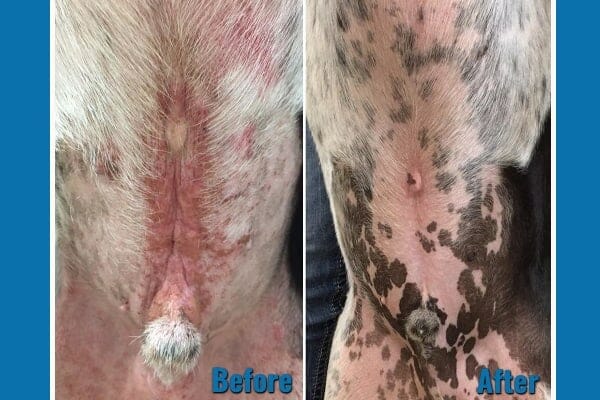Free Facts For Deciding On Collagen For Dogs
Free Facts For Deciding On Collagen For Dogs
Blog Article
How Can Omega-3 Fatty Acids Aid In Joint Health For Dogs And Cats?
Omega-3 fatty acrs, EPA Eicosapentaenoic as well as DHA docosahexaenoic acids are important for maintaining and improving joint health in dogs as well as cats. This is the way to do it:
Anti-inflammatory properties
Reduce inflammation:
Function: Omega-3 fat acids have powerful anti-inflammatory properties. They inhibit the production of pro-inflammatory Eicosanoids and cytokines, which are substances that contribute to inflammation.
Omega-3s are helpful in reducing inflammation of the joints. They help to decrease swelling and pain that are associated with arthritis. This can improve the quality of life for pets by increasing the comfort for pets.
Joint Lubrication and Health
Improved Joint Lubrication
Function Essential: Omega-3 acids are necessary for the maintenance of synovial fluid that lubricates your joints.
Benefits of better lubrication - It results in smoother joint movement and less friction. This reduces wear and tear on the cartilage. This is especially beneficial for pets suffering from joint problems or at risk.
Cartilage Protection and Repair
Cartilage Protection:
Function: Omega-3s assist in keep cartilage healthy through lowering enzymes that break down cartilage.
Benefits: Protecting cartilage from degrading maintains joint integrity and helps slow the progression joint diseases such as osteoarthritis.
Immune System Support
Immune System Regulation:
Function: Omega-3 acids regulate immune responses, encouraging a balance in inflammation.
Benefits: A properly-controlled immune system can better manage joint issues, while avoiding the development of joint inflammation and injury.
Comfort and mobility are enhanced
Better Mobility
Omega-3s may help your pet move more comfortably by reducing inflammation and preserving joints.
Benefits: Senior pets as well as those suffering from arthritis are often more mobile and have less pain. This allows them to enjoy a healthier and more active life.
Additional Health Benefits
Overall Health
Function Benefits: Omega-3 Fatty acids also aid in promoting cardiovascular, skin and hair health in pet.
Benefits: A pet that has more bone and joint health is more likely to be active.
Use and Considerations
Dosage, administration and dosage: The dose of Omega-3s that's appropriate for your pet is based on its size, weight and the specific health condition. Consult your veterinarian for the instructions listed on the label of the product.
Omega-3s are present in premium fish oils that are of high-quality. To ensure safety and efficacy, it's important to select products that are specifically formulated for pets.
Omega-3 supplements may cause negative side effects. Some pets have stomach problems or fishy breath. Starting with a lower dose and gradually increasing it can reduce the risk of adverse negative effects.
Conclusion
Omega-3-fatty acids have a positive impact on joint health in cat and dog. They can reduce inflammation, improve joint lubrication, protect cartilage and aid in the development of immunity all aid in achieving better joint function and less discomfort. Regular supplementation leads to better mobility and a more active, healthy life for your pet. Have a look at the recommended pet wellbeing australia advice for website advice including pet rhodiola supplements, pet supplements for pets with fear of crates and pens, pet supplements for pets with skin infections, urinary infection in dogs, pet supplements for pets with fear of sirens and horns, pet supplements for pets with fear of injury, pet supplements for breeding dogs and cats, pet coat supplements and more.
How Does Omega-3 Fatty Acids Assist Pets And Cats Suffering From Kidney Failure?
Omega-3 fatty acid acrs, in particular EPA(eicosapentaenoic ACr) as well as DHA (docosahexaenoic acr) can help manage kidney failure by supporting kidney health. Here are a few ways that they can aid in managing kidney disease:
Anti-inflammatory Properties
Inflammation reduction:
Function The Omega-3 fatty acids exhibit powerful anti-inflammatory properties, which reduce the production of pro-inflammatory cytokines as well as eicosanoids.
Benefits In reducing inflammation within the kidneys, omega-3s can help slow the progression of kidney damage and enhance kidney function.
Blood Pressure Regulation
Lowering Blood Pressure:
Function: Omega-3 acids regulate blood pressure by enhancing the vascular system and decreasing overall inflammation.
Benefits: Lowering blood pressure protects kidney function and reduce the progression of kidney disease.
Proteinuria Reduction
Reducing Proteinuria:
Function: Omega-3s can help in reducing the leakage of proteins into the urine, known as proteinuria, which is a frequent problem in kidney disease.
The benefits of decreasing proteinuria This can help protect kidney function and reduce the risk of further kidney damage.
Preservation of Glomerular Filtration Rate (GFR)
Supporting Kidney Filtration
Function The Omega-3 fatty acid assists maintain the integrity of the glomerular filtering process, through kidneys that filter blood.
Benefits: Maintaining stable GFR levels is essential for maintaining kidney function and also preventing the progression of chronic diseases.
Appetite Stimulation (nutritional Support)
Improving appetite:
Omega-3s aid in improving appetite, and can also boost the amount of nutrition consumed by pets with kidney failure.
Benefits: A higher nutritional intake can improve overall health, and help pets with kidney disease keep their weight in check and maintain muscle mass.
Cardiovascular Health
Helping Heart Health
Function: Omega-3 fats support cardiovascular health through decreasing inflammation, lowering blood pressure and improving the lipid profile.
Benefits: A better cardiovascular system will reduce the chance of complications, such heart disease or kidney failure. Additionally, it enhances overall health.
Antioxidant Effects
Reducing Oxidative Stress:
Function They are antioxidants that help reduce oxidative damage to the kidneys.
Benefits: Reducing oxidative stress assists in protecting kidney cells from damage, supporting the kidney's function and slowing disease progression.
Use and Considerations
Dosage & Administration: The amount of omega-3 fatty acid to administer is contingent upon the size, weight, and health condition of your pet. The recommendation of the veterinarian or product's label are important. Omega-3s are often found in supplements to fish oil specially designed for pet use.
Formulations: Omega-3 supplements for pets can be found in many forms, such as capsules, liquid oils and chews. It's important to choose a high-quality product to ensure safety and efficacy.
Omega-3 supplements generally are pet-safe, however they can cause stomach upsets. Start with a smaller dose and gradually increasing it will aid in minimizing the consequences. Monitoring any adverse effects like vomiting or diarrhea is essential.
Also, you can read our conclusion.
Omega-3 fatty acids can provide significant benefits for managing kidney failure in dogs and cats. Their anti-inflammatory, blood pressure-lowering, proteinuria-reducing, and appetite-stimulating properties help support kidney function and overall health. Omega-3 supplements can slow down the progress of kidney disease as well as improve the overall quality of life for pets who have kidney failure. See the best dog herbalist recommendations for site advice including cushings disease alternatives, pet supplements for pets with eye problems, pet supplements for senior pets, pet supplements for pets with seizures, pet supplements for pets with dry skin, pet supplements for pets with motion sickness, pet supplements for pets with joint stiffness, pet lavender supplements and more.
Apple Cider Vinegar Can Be Used For Yeast Infections For Dogs And Cats.
ACV can be used as a treatment for yeast infections in cats and dogs. While there is anecdotal evidence and a few studies that suggest that it may have benefits, it's important to use ACV with caution and under medical supervision due to its acidic character and possible unwanted side negative effects. ACV can be used for treating yeast-related infections.
Antifungal Properties
Acidic Environment:
ACV functions as an acidic product, with an average pH of between 2.5 and 3. This acidic pH may hinder yeast growth.
Benefits of the use of ACV: Applying ACV dilute on top of the head, or adding ACV to pet bath water can reduce yeast on the ears and skin.
Skin pH Regulated
Balancing Skin pH:
Function: ACV is believed to assist in the balance of pH levels, which may help support a healthy skin barrier and reduce yeast growth.
Benefits: Keeping a healthy pH balance on the skin can in preventing yeast infections and boost overall skin health.
Anti-inflammatory Action
Reduce inflammation:
Effect: ACV has mild anti-inflammatory properties.
Benefits: Reducing inflammation helps to reduce symptoms such as redness, discomfort and irritation caused by yeast infections.
Support for Digestive Health
Internal Use
ACV's primary function is to improve digestion by balancing the gut flora when ingested at very low doses and in highly diluted form.
Benefits: A healthy gut environment supports overall immune functions and imbalances in microbial activity that can limit the growth of yeast.
Use and Considerations
Topical application: Mix ACV with water (typically 1 part ACV to 1-2 parts water) and apply it as a wash or spray on affected areas of the ear or skin. Do not apply it to open wounds and sensitive skin.
In the event of you are considering internal use, always consult with a vet first. ACV should be highly diluted (e.g., 1 teaspoon to 1 tablespoon per cup of water) and used in small amounts to avoid possible stomach upset or irritation.
If you apply ACV topically, be on the lookout for signs of irritation and allergic reactions. If you experience any adverse reactions, stop using ACV.
Consultation with Veterinarians: Before making use of ACV to treat yeast infections in pets, it is important to consult with a veterinarian. They can assist you with the proper dilution techniques, application techniques, and the risks associated with your pet.
Click here to view the entire article. Click here to view the full
Apple cider vinegar can be used to treat yeast infections in dogs and cats, but it should only be administered under the guidance of a vet. Acidity in ACV may create a toxic environment for yeast growth on the ear and face and may also provide mild anti-inflammatory effects. To avoid irritation or adverse reactions, it's important to use ACV with care. ACV is safe and effective when it is administered under veterinary supervision as part of a comprehensive treatment program for yeast infection in pets. Read the best kidney failure in dogs url for website tips including herbal pet supplements, pet energy supplements, pet multivitamins, pet ginger supplements, pet egg protein supplements, pet supplements for working dogs, pet supplements australia, pet devil's claw supplements and more.